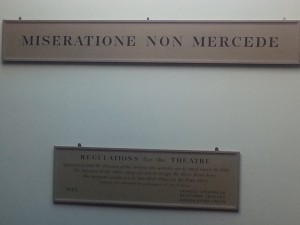I live in Stepney Green, which is a short journey from the venue, the other side of London Bridge, at The Old Operating Theatre. A venue I didn’t know existed until I was invited to the Discussion of Satish Modi about his book, In Love With Death.
I was met by the PR team of Curzon after climbing an amazing winding staircase, which seemed to go on forever, but probably more to do with my level of fitness, even if it was unusually steep. Miriam and Daniel, from Curzon, talked about the venue and how amazing it is. And they were not lying! It is deceptively larger than it appears! In every corner there are instruments of an era gone by! Not instruments that you would play in an orchestra, this was a theatre of another performance. It was of the anatomical design.
The surgical equipment seemingly represents implements of torture, and in many cases they could well be justifiably deemed as such. However, our modern science will probably be deemed the equivalent when historians of the future look back at the leaps and bounds they have done from our era.
In between routes from cabinet-to-cabinet, I am distracted by potions, salves, acids and solutions. Powders, herbs, compounds and products… all which would be an alchemists dreams. Considering the layout and structure of the venue, I am amazed at how many things are actually fitted into the room.
My wandering mind and eye was brought back to the reason I was there and I was introduced to Satish Modi, who is a soft spoken man with a calming face and demeanour. He spoke about the venue also and how fitting it was for the subject at hand, but also on how human’s perception of death is viewed. I was happy to discuss the subject of death, as I feel, as Satish does, that as it is inevitable we should be freer of the stigma that it seems to have. Unfortunately, I had to wait to talk to him further, as I was monopolising him from talking to other guests.
Luckily, I was able to chat to the Curator of The Old Operating Table, Julie Mathais. She was very accommodating about questions regarding the venue and informed me that it used to be the operating theatre of the old St Thomas’, a free hospital for the poor workforce and patients were wheeled in from the ward for procedures that are shocking by modern days standards. I did ask why this place is not more well known! It just seems to a place that would not only inform, but the cases of memorabilia would surprise many well versed in the medical trade, let alone the general public. However, Julie is busy lecturing those as young as year 1 through to medical students that come to learn of the history of their profession. Also groups of people through the summer and open 7 days a week!
When we are shown to the viewing gallery for the presentation, Julie gets a volunteer from the stands and demonstrates, without any actual surgery, what would have happened in a 16th century surgery. The luxury of sanitation, hygiene and patient care are not a consideration, so a surgeon’s speed was essential to minimise trauma, if that was at all to be believed. Julie mentioned that whilst an elixir of brandy and opiates were given to the patient to help recovery (Approximately a litre and a half), only 1 in 3 survived the procedures and most deaths occurred on leaving the hospital, which would have been laced with all forms of infectious diseases and septicaemia would have been inevitable. After mimicking the procedure, featuring a display of tools used for an amputation, the volunteer was allowed back to the stands, without the recovery elixir.
Satish then came forward and began with why he wrote the book and didn’t really know he was going to write one, as it all started in Japan!
When Satish visited Japan, the then elderly Buddhist nun said that she had met him before and it was before in a previous life! Every time they met, she was overcome with emotion and treated him as a guest of honour. He stay was very much one of experience and as a guest of the Japan. However, when it came time to leave, Satish wanted to know how he would see her again, as she said that she would keep in contact. She replied, “Through your dreams”.
Whether it was that, or the fact Satish was conscious of being unable to contact her through conventional means, he started to have vivid dreams and would have his secretary write down the dreams before he would forget them! He would keep a diary of them and before he knew it, the book was a concept waiting to be published even before the thought of writing one was evident.
I think the most poignant anecdote of the talk was the story of 2 brothers and their father gave them each large sums of money. The eldest was given $200 million and the youngest was given $100 million. The youngest one was upset at receiving less than his brother and was discussing it with Satish! He explained that he should not see it that way, because if they were to die, his brother would have twice as much to lose! He continues to expand on the fact that death is an equaliser. When we all die, we are the same. The billionaire will be put in the ground the same as a pauper.
Satish finishes his talk with an excerpt from his book, of which all proceeds go to charity, and we go back into the main area to continue one-to-one talks.
Strangely enough, we all talk until we are reminded of the time and the curator needed to close the venue and be ready for the following day’s clientele.
We slowly break up and go our separate ways.
I read some of the book on the way home and almost miss my stop in doing so. I find it engaging and as enlightening as talking to the man himself!
The book is available, at £9.99, from the www.curzonpr.com, or www.inlovewithdeath.com
Also all details of The Old Operating Theatre Museum can be found at www.thegarret.org.uk, or contacting 0207 1882679
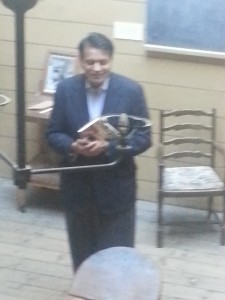 Satish Modi reading an excerpt from his book In Love with Death
Satish Modi reading an excerpt from his book In Love with Death
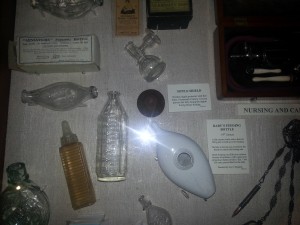 Maternity items of an era past
Maternity items of an era past
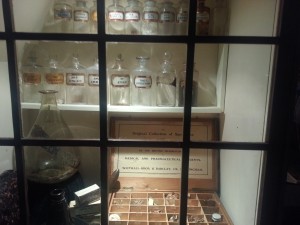 A veritable witch’s treasure trove.
A veritable witch’s treasure trove.
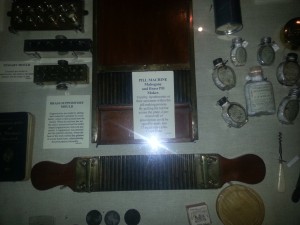 Body parts in Formaldehyde on display
Body parts in Formaldehyde on display

